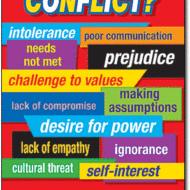Posted by Managementguru in How To, Human Resource, Organisational behaviour, Training & Development
on Jul 16th, 2016 | 0 comments

What is a conflict? An organization is a network consisting of human element as the major functional source and as such is prone to weaker vulnerable aspects of human psychology. Conflict is, of course, one such weak point. The diverse functional groups in the organization get into conflicts while setting up objectives and goals; in prioritizing and weighing the objectives, the methods of their achievement and their evaluation. Though there are numerous kinds of conflicts, this is the major one affecting the functioning of the firm. Organizational conflict, or workplace conflict, is a state of discord caused by the actual or perceived opposition of needs, values and interests between people working together. Conflict takes many forms in organizations. Certain examples of conflicts: The objective of a project manager to construct a building might go against the objective of minimizing the project cost. For work force, their personal goals come before the organizational goals. The objective of the production department to increase productivity may go against the objective of maintaining the product quality. The objectives of the marketing department to increase the sales through promotions may not be welcome by the finance department whose objective will be to cut the cost. Reasons for conflicts: Lack of clarity as to the scope and relevance of functions in achieving the corporate objectives. Clash between line and staff authorities. Ignorance or lack of knowledge needed for decision making in the part of chief executives Different sets of beliefs and views, along with one’s personal interest and ego. Different kinds of attitudes of members of the organization Absence of clarity in organizational policy, procedures, rules and guidelines. The Results of Conflict: The most affected element in a group conflict is “Employee Morale.” Conflicts undermine professionalism and lead to under utilization of organizational capacity. Loss of Importance: A particular group of employees feel that their importance is being undermined. When a manager is being inducted from an outside source, the prospective employees of the firm feel that they have been let down by the management. Frustration: There are certain rules and regulations to be stuck to when issues arise. If the finance department is not consulted regarding issues related to insurance claims, there are chances that the company might lose a good deal. In such cases frustration arises which is not good for the health of the firm. Feeling of Insecurity: This affects severely the morale of an employee. A clerical staff feels insecure if new technological system is introduced in the company where he is a novice. When one’s importance is persistently reduced, he may start feeling redundant. Blocked Personal Growth: Persons who experience reduced importance may apprehend a situation where they don’t expect much by way of personal growth through increments and promotion. Functional Conflicts: Functional conflicts support the goals of a group, improve its performance and are constructive in nature. Dysfunctional conflicts hinder the performance of a group and are destructive in nature. It has not been precisely defined, as to what criterion demarcates functional from the dysfunctional. It is only the group’s performance and the delivered result or outcome that determines the nature of the conflict. Conflicts, irrespective of their type can bring these benefits to the firm: Bring hidden issues to the surface. Encourage creativity and innovation. Improves communication and make changes more acceptable. Increases group cohesion. Conflict Management – Conflict is a Part of Organizational Life Managers need to be alert to the presence of conflicts. Their focus should be oriented towards the goals to be accomplished. If there is a conflict, they should aim to resolve it smoothly by not over-reacting to the situation. They should take the help of persons who can best settle the issue, be ready to bargain and not issue orders. Their concentration should be on the problem and not on persons. True to the saying – Am I not destroying my enemies when I...


